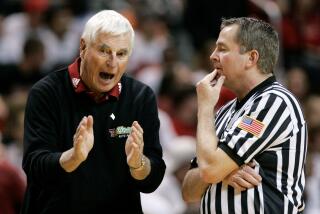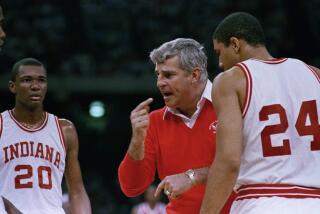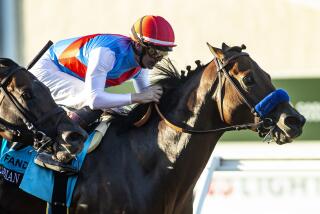Turnaround for Knight
- Share via
BEIJING -- Three months ago Brandon Knight was nearly out of hope, clearly out of options and all but out of baseball.
“He was going to quit,” said his father, Mike Knight.
Instead, Knight signed with the Somerset (N.J.) Patriots of the independent Atlantic League, one of the few places where a 32-year-old journeyman pitcher with 19 innings of major league experience and a losing record in the minors can still find work.
But then a funny happened. Brandon Knight got good. Really good. The offers came quickly. First from the New York Mets, who in May gave the right-hander a chance to pitch in the minor leagues. Then USA Baseball, which offered Knight a spot on the Olympic team. A week later it was the Mets again, this time offering Knight a chance to take Pedro Martinez’s place on the mound at Shea Stadium during a pennant race.
Mike Knight, who taught his son the game’s fundamentals on the fields and sandlots of Oxnard, remembers how crazy a time that was.
“It’s almost too much good news all at once,” he said. “He was ready to get out of the game and all of a sudden got back in and now all kinds of great things are happening.”
Knight may be on the mound when the Olympic baseball tournament opens Wednesday, when the Americans face South Korea, a semifinalist in the inaugural World Baseball Classic. His manager, however, is keeping that last part a secret.
“We do have a starting rotation figured out,” said Davey Johnson, who used to manage the Dodgers, “but in international play, I found out that nobody wants to tell us who they are pitching. So I’m going to be mum on that subject.”
Knight took a long and often tortuous path to potential Olympic glory.
Selected by the Texas Rangers from Ventura College in the 14th round of the 1995 draft, he spent much of the next 13 years pitching in the minor league systems of the Rangers, Yankees and Pirates. He had two brief stays in the majors with the Yankees, giving up more runs than he had innings pitched, then spent three years in Japan.
None of it appeared to be leading anywhere, though, so each winter Knight would do some soul-searching. “This last year was the same kind of thing,” his father said. “Do I do this again or not?”
Eventually Knight decided yes, and his tenacity has been rewarded with the best summer of his career, one in which he led the Atlantic League in strikeouts through six starts before jumping to the Mets’ triple-A affiliate in New Orleans, where he was 5-1 with a 1.60 ERA in 11 games.
Johnson sees Knight as a guy who can have a good influence on the young staff, with one big bonus. “His numbers are really off the chart,” Johnson said. Selecting him “was kind of a no-brainer.”
Truth be told, the decision wasn’t as simple for Knight. The Mets’ call-up, 10 days after he was named to Team USA, threatened to derail his chance to pitch in Beijing because players in the majors aren’t eligible for the Olympics.
After so many seasons in which he had largely felt unwanted, suddenly Knight was presented with two once-in-a-lifetime opportunities.
But when the New York game Knight started lasted 14 innings, the Mets, desperate for bullpen help, designated him for assignment, clearing his way to return to the Olympic team.
“It was probably the weirdest feeling I ever had in baseball, just being so unsure about what I would rather do,” he said. “Would I rather go to the Olympics? Would I rather go to the big leagues? I obviously haven’t been to the big leagues in five years. But I’m never going to get a chance to go the Olympics again.
“Bottom line, the most important thing for me and my family is to be in the big leagues,” the father of two said. “I’m not going to make any money going to the Olympics. Of course it’s a great honor. But I need to think about supporting, feeding my family.
“That being said, this whole Olympic thing, it’s such an honor. And it’s so cool to have a chance to do it. It’s a no-lose situation. As far as my age, I didn’t think that there would be a chance at all. I didn’t even think about being in the Olympics.
“So it couldn’t have worked any better. Go up there, pitch in the big leagues, and then come back and do this.”
--
More to Read
Go beyond the scoreboard
Get the latest on L.A.'s teams in the daily Sports Report newsletter.
You may occasionally receive promotional content from the Los Angeles Times.











